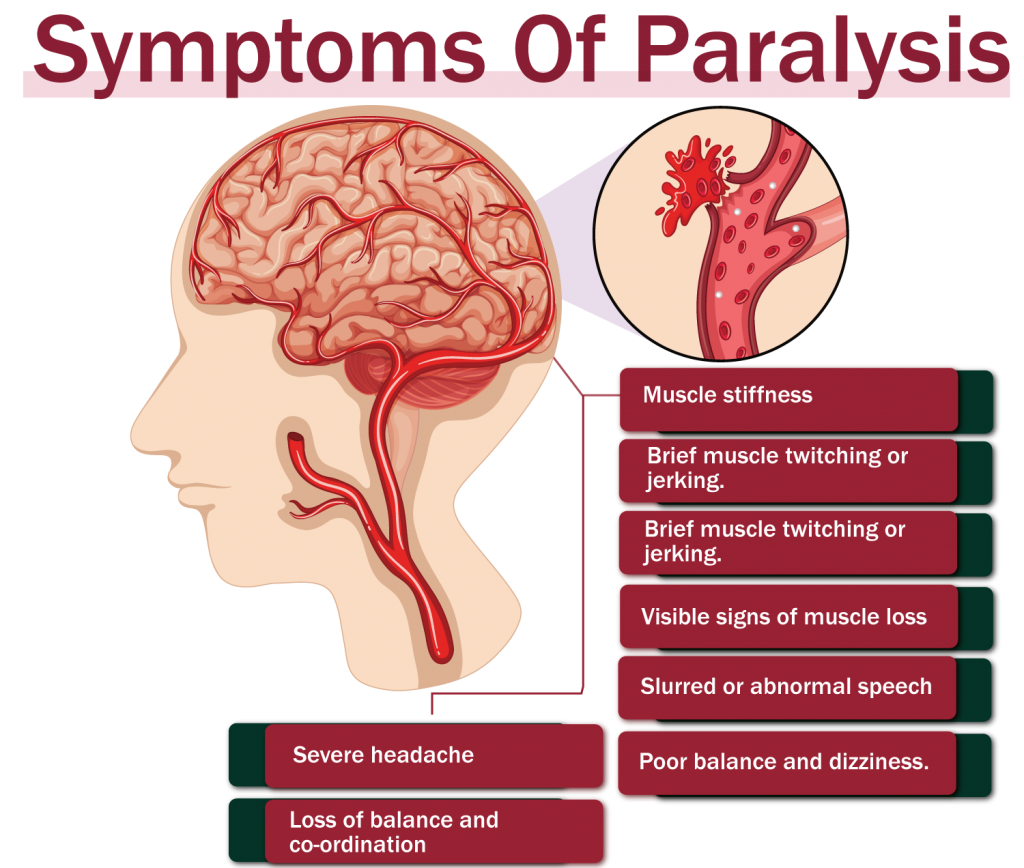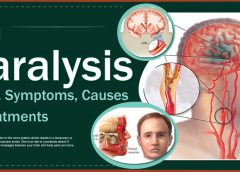What is Paralysis?
Paralysis is caused by a disorder in the nervous system which results in a temporary or permanent loss of voluntary muscular action. One is at risk of a paralysis attack if there is an issue with the way messages between your brain and body parts are transmitted. As a result, our brain doesn’t send the signal needed to control the corresponding muscle, leading to loss of control.
Your paralyzed body may be paralyzed on one or both sides. It could happen in a single location or throughout a large area. Paraplegia is a condition in which the bottom half of the body is paralyzed, including both legs. Quadriplegia is a condition where paralysis impacts both the arms and legs.
What Happens During a Paralysis Attack?
Paralysis​ occurs due to brain stroke and impairs muscle movement. During a paralysis attack, an individual will experience one or many of the following abnormalities:
- Loss of sensation in arms and legs,
- Reduced muscle function,
- Loss of voluntary motor function
- Dizziness
- Inability to talk.
Paralysis can create problems with blood flow, breathing, how well your organs perform, speaking or swallowing, sexual responses, or regulating the urge to go to the bathroom.
Is Paralysis Temporary or Permanent?
Permanent Paralysis:- When muscle control never comes back.
Temporary Paralysis:- When some or all muscle control returns. Paralysis can affect any part of the body. It can be:
- Partial Paralysis(Paresis):- You can control some muscles, but not all.
- Complete Paralysis:- You have no control over any muscles
What Causes Paralysis?
A disruption in brain function is usually the cause of paralysis of a body part. In medical terms, disruption in brain function is known as a brain stroke. There is a lack of mobility and/or sensory loss with this condition. In this type of paralysis, an individual may experience limited cognitive ability and loss of memory.
Some common reasons for brain stroke include high blood pressure, old age, high blood sugar, hyperlipidemia, uncontrolled fever, seizures, etc. Head injuries can also lead to brain stroke.
Tumours and cysts that increase pressure on the brain nerves and their surrounding structures may also lead to brain stroke. A few genetic disorders also lead to paralysis like GB syndrome. Cerebral palsy is a common cause of paralysis in children. Paralysis in arms and legs, also known as quadriplegia. causes of paralysis in arms and legs
Spinal cord injury (SCI), head injury, peripheral neuropathy, stroke, and multiple sclerosis are among the most common causes of paralysis.
Paralysis in arms and legs, also known as quadriplegia, can be caused by a variety of conditions that disrupt the communication between the brain and muscles, leading to these causes of paralysis in arms and legs.
The most prevalent paralysis causes are listed below.
1. Head Injury
2. Spinal Cord Injury [SCI]
3. Stroke
4. Peripheral neuropathy
5. ALS [Lou Gehrig’s disease]
6. Multiple Sclerosis
7. Guillain – Barre Syndrom
8. Cerebral Palsy
9. Toxins / Poisons
10. Tumors of the brain or spinal cord
11. Inherited diseases, such as spinal muscular atrophy and partial paralysis due to hypo- or hyperkalemia
Types of Paralysis
Complete paralysis: When you can’t move or control any muscles at all. In some cases, there may be no sensation as well.
Partial or incomplete paralysis: When you can control some but not all muscles.
Localized paralysis: Affects a small area of the body like your face, hands, feet, or vocal cords.
Generalized paralysis affects several bodily parts at a time and is spread across a large area.
- Monoplegia is a kind of paralysis that affects only one limb.
- Diplegia is a condition in which both arms, legs, or sides of the face are affected.
- Hemiplegia is paralysis of one side of the body and is most commonly caused by a stroke on one side of the brain.
- Quadriplegia (or tetraplegia) is a type of paralysis that affects all four limbs as well as various organs.
- Paraplegia is the term for paralysis from the waist down.
A locked-in syndrome is the most severe and unusual type of paralysis, in which a person loses control of all muscles except those that control eye movements.
What is Sleep Paralysis and What Causes It?
Sleep paralysis is a temporary inability to move your muscles while falling asleep or waking up. It can be a frightening experience, often accompanied by hallucinations and a feeling of pressure on your chest. While absolutely terrifying, sleep paralysis itself is harmless. However, it can be disruptive to your sleep and lead to anxiety about falling asleep.
Several factors can increase your risk of sleep paralysis, including:
- Sleep deprivation: Not getting enough sleep is a major contributor to sleep paralysis.
- Sleeping on your back: Studies have shown a link between sleeping on your back and increased episodes.
- Mental health conditions: Anxiety and stress can make sleep paralysis more likely.
- Certain medications: Some medications, like antidepressants, can be a contributing factor.
Narcolepsy: This sleep disorder can cause frequent sleep paralysis episodes.
Read More: What is Insomnia (sleep disorder)? Common Causes, Symptoms & Types
What are the Symptoms of Paralysis?

1. Unexplained numbness around the arm, leg, or side of the face
2. Confusion
3. Muscle stiffness
4. Brief muscle twitching or jerking.
5. Muscle cramps and weakness
6. Visible signs of muscle loss (muscle atrophy)
7. Slurred or abnormal speech
8. Poor balance and dizziness.
9. Loss of balance and coordination
10. Severe headache (Migraine)
Paralysis Diagnosis and Tests
1. X-ray reveals damaged bones that could cause injuries.
2. CT scans and MRIs are used to look for evidence of a stroke, brain injury, or spinal cord injury. Bones, muscles, and tissues are visible in a whole-body imaging scan.
3. A myelogram is a test that looks for damage to the spinal cord and nerves.
4. An electromyogram (EMG) measures nerve and muscle electrical activity.
5. A spinal tap (lumbar puncture) checks for infection, inflammation, and diseases like multiple sclerosis in the spinal fluid (MS).
What are the Complications of Paralysis?
Paralysis majorly impacts respiration and heart health. Aside from this, ignoring early symptoms can lead to a variety of physiological and mental problems.
Depending on the type of paralysis, one may face or encounter:
1. Breathing difficulties, coughing, and the possibility of pneumonia
2. Blood clots and deep vein thrombosis (DVT)
3. Speech or swallowing problems (Dysphagia)
Treatment for Paralysis
There is no cure for permanent paralysis. The spinal cord once damaged is unable to heal itself. However, temporary paralysis can be resolved over time through timely care and treatment. Physical, occupational, and speech therapy can help people with paralysis.
Surgery can help minimize swelling or inflammation caused by a brain stroke or spinal cord injury in certain situations, but not all. To avoid the onset of viral or bacterial infections, equivalent care time and attention are required post-surgery.
In some cases, alternative medicine is also used to accelerate recovery from temporary paralysis. However, it would be wrong to rely completely on these treatment procedures. The best thing to do is see an expert and follow his advice. Support from family members and friends is also an essential element of paralysis treatment and recovery.
Conclusion
Paralysis has the potential to negatively impact a person’s entire life. Finding timely treatment and care for paralysis is difficult.
According to research conducted by the Reeve Foundation, roughly 5.6 million people in the United States suffer from paralysis. The statistics for the rest of the globe are much more depressing.
A routine health check-up is necessary to guarantee that one is not at risk of a paralysis attack. At Kayawell, we make locating the best health professionals in your area as simple as clicking a button. With a quick search, you can contact the most reputable doctors in your area.

Leave a Reply
You must be logged in to post a comment.